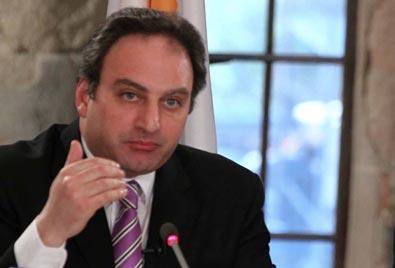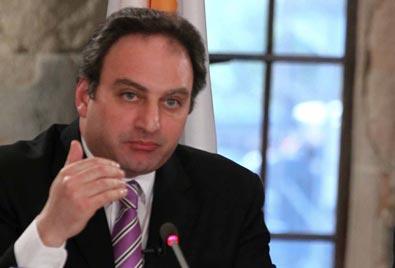
The Cyprus problem: what is the government’s policy? by Stefanos Stefanou – member of the Political Bureau of AKEL, former Government Spokesperson
30th of April, 2014
 The recent provocative statements made by Turkish Cypriot leader Dervis Eroglu again brought to the fore the tactics pursued by the Turkish Cypriot side on the Cyprus problem. On the one hand, it is trying to provoke obstacles and a stalemate in the negotiations with the positions it is submitting at the negotiating table. On the other hand, with communication tactics it is trying, in the event of a deadlock, to put the responsibilities on the Greek Cypriot side. The Turkish Cypriot side is seeking to do this too in a simple manner. Making a 180 degree turn from previous positions he supported, Mr. Eroglu supports the continuation of the negotiations from the point he had broken them off in March 2012.
The recent provocative statements made by Turkish Cypriot leader Dervis Eroglu again brought to the fore the tactics pursued by the Turkish Cypriot side on the Cyprus problem. On the one hand, it is trying to provoke obstacles and a stalemate in the negotiations with the positions it is submitting at the negotiating table. On the other hand, with communication tactics it is trying, in the event of a deadlock, to put the responsibilities on the Greek Cypriot side. The Turkish Cypriot side is seeking to do this too in a simple manner. Making a 180 degree turn from previous positions he supported, Mr. Eroglu supports the continuation of the negotiations from the point he had broken them off in March 2012.
It is obvious that Mr Eroglu is fully exploiting the absence of a specific policy on the Cyprus problem on the part of the Government. This fact allows the Turkish side to seek with one stone to hit two targets: to undermine the prospect of the negotiations and to come out on top as far as impressions are concerned.
Fourteen months after taking office, the President of the Republic must decide what policy he will follow on the Cyprus problem. Will he continue to discuss in essence from scratch, offering the Turkish side the possibility of dragging its feet without any repercussions or will it decide to give a perspective to the negotiations by seeking to continue the negotiations from the point the Turkish side had broken them off?
If it continues the tactics of waging a dialogue from scratch, developments are predestined. The differences between the two sides will continue to grow and the negotiations will get bogged down and culminate in an impasse. This completely suits Turkey since it is exploiting the passage of time to consolidate the occupation faits accomplis on the ground, even more so when it is almost certain that in the event of such a development the international community will apportion responsibilities also on the Greek Cypriot side. In case of a deadlock, there is always a danger of foreign circles trying to impose a plan for a solution that will not serve the interests of our people.
There is only one way out of this situation. The President should call for the continuation of the negotiations from the point they had been broken off, taking advantage of what was achieved during the negotiations waged in the period 2008 – 2010 with the achievement of significant convergences in three of the six chapters on the Cyprus problem: namely governance, the economy and European issues. Mr. Eroglu disagrees with many of these convergences. If trapped in his tactical maneuvering he is forced to agree, then, even with difficulties, the prospect of a solution is opened up. If it rejects the proposal, then the Turkish side will be apportioned with the responsibility for the deadlock.
The President must finally abandon the petty-political expediencies and considerations and should take the decision to take the initiative before it’s too late.




